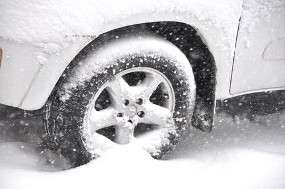 There is more to winter tires than Denver drivers may think. Those days of clunky, tractor-like snow tires are long gone in Colorado. They have been replaced by high-tech winter tires with special rubber compounds and advanced tread designs.
There is more to winter tires than Denver drivers may think. Those days of clunky, tractor-like snow tires are long gone in Colorado. They have been replaced by high-tech winter tires with special rubber compounds and advanced tread designs.
In Denver winter temperatures, the rubber in summer tires becomes hard and inflexible and they don’t grip the road as well. In contrast, winter tires use special rubber compounds that are more pliable when the thermometer drops below 45 degrees, giving you better road contact; so even if you don’t get much snow, winter tires will really add to your cold weather safety in Denver.
Winter tires may also use a micro-pore rubber compound that increases surface area so they can bite into ice and packed snow on Denver roads and highways.
The tread on winter tires needs to clear out water, snow and slush as the tire turns so it’s ready to take another bite when it comes back in contact with the road. But summer tires can actually be dangerous because they get packed with snow, making them very slick, so your vehicle will be hard to control. Winter tires have a lot of thin slits in the tread which help the tire grab ice and packed snow, providing extra traction.
Many new vehicles in Denver come with all-season tires which are good for a wide range of Denver weather and road conditions, but don’t provide top performance in Colorado snow and ice. For example, winter tires provide 25 to 50% more traction than all-season tires. And all-season tires take up to 42% longer to stop than winter tires in slick conditions. For all these reasons, the tire experts at Express Car Care in Denver recommend you put winter tires on all four wheels because it makes sense to have equal traction and handling at all four corners of your vehicle. Uneven traction could result in loss of control for Denver motorists.
Your vehicle may be equipped with stability control, anti-lock brakes and traction control – all important safely systems for Colorado auto owners. But in order to do their job you still need good traction. Winter tires help you start, stop and corner when things get cold and slippery.
So when temperatures drop below 45 degrees, be sure you have a set of four winter tires for maximum performance in snow, ice and wet Denver roads. Your Express Car Care professional can help you find the right winter tire for your vehicle and driving needs. Give us a call @ 303-691-2760 or come in and see us.

Leave a Reply
You must be logged in to post a comment.